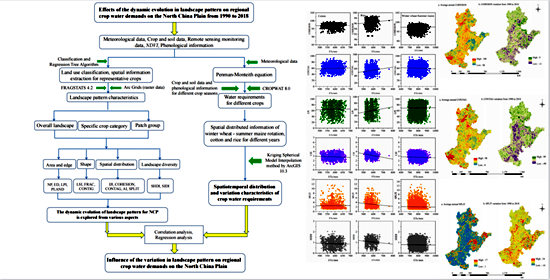Research Revealed Potential Relevance between Ecological Landscape Pattern and Regional Crop Water Requirement in Arid or Semi-arid Areas
Globally, ecological landscape pattern affects geography, environment and hydrologic processes in land surfaces. As the crucial factor in hydrological cycle, crop water requirement maintains sustainable agricultural development and the stability of ecological functions. Previous studies mostly focused on the relationships between various environmental factors and agricultural water demands. However, there has been a lack of systematic inspection of the response of crop water requirement to regional ecological landscape pattern. This deficiency is critical because crop evapotranspiration is not only a pivotal element in hydrological circulation and agricultural system, but also an essential ecological process in regional ecosystem, especially in some ecologically vulnerable arid or semi-arid areas. Variation in landscape pattern will trigger changes to regional ecological environment and productivity. Crop water requirement is closely connected to the sustainable development of agricultural production and ecological stability. Hence, it is of great significance to examine the response of crop water requirement to the dynamic evolution of landscape pattern.
Landscape pattern on the North China Plain revealed prominently spatiotemporal heterogeneity in area, morphology, configuration, connectedness, aggregation and diversity, owing to the spatiotemporal differentiation in land cover and the uncertainty of human activities and environmental variables. Influence of landscape pattern on crop water requirement varied with spatial scale. At landscape level, enhanced patch amount, structure complexity and aggregation tend to reduce crop water requirement, while intensive landscape spatial connectedness and adjacency would promote that. At class level, influence of landscape pattern on crop water requirement varied with crop category, owing to their differing appropriate growing environments. The results can provide theoretical guidance for sustainable ecological landscape planning aiming to permit reasonable allocation of water resources in regions of large-scale agricultural development.
By Song Ni (songni@caas.cn)

-
 Apr 18, 2024Opening Ceremony of the Training Workshop on Wheat Head Scab Resistance Breeding and Pest Control in Africa Held in CAAS
Apr 18, 2024Opening Ceremony of the Training Workshop on Wheat Head Scab Resistance Breeding and Pest Control in Africa Held in CAAS -
 Apr 03, 2024IPPCAAS Co-organized the Training Workshop on Management and Application of Biopesticides in Nepal
Apr 03, 2024IPPCAAS Co-organized the Training Workshop on Management and Application of Biopesticides in Nepal -
 Mar 28, 2024Delegation from the School of Agriculture and Food Science of University College Dublin, Ireland Visit to IAS, CAAS
Mar 28, 2024Delegation from the School of Agriculture and Food Science of University College Dublin, Ireland Visit to IAS, CAAS -
 Mar 25, 2024Director of World Food Prize Foundation visited GSCAAS
Mar 25, 2024Director of World Food Prize Foundation visited GSCAAS -
 Mar 20, 2024Institute of Crop Sciences (ICS) and Syngenta Group Global Seeds Advance Collaborative Research in the Seed Industry
Mar 20, 2024Institute of Crop Sciences (ICS) and Syngenta Group Global Seeds Advance Collaborative Research in the Seed Industry
